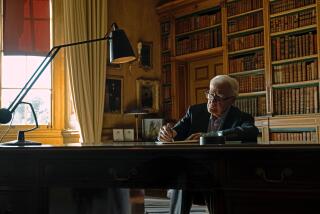Review: âThe Unknown Knownâ finds Donald Rumsfeld free of self-doubt
If you know anything about gifted documentarian Errol Morris â or about recent secretaries of Defense for that matter â comparing his new film, âThe Unknown Known,â with his earlier work, 2003âs Oscar-winning âThe Fog of War,â is all but inevitable. At least at first.
Both films are smartly constructed one-interview films featuring an 80-something former Defense secretary who spends considerable time talking about his role as the voice of one of the most unpopular wars of recent American history. But thatâs where the similarities end and personal differences take over.
For if âFog of Warâsâ Robert McNamara was shown to be troubled by decisions he was part of during Vietnam and earlier conflicts, then Donald Rumsfeld, the man in charge during the 2003 Iraq invasion, shows no such compunctions about his parallel position.
BEST MOVIES OF 2013: Turan | Sharkey | Olsen
Energetically unrepentant and serenely free of self-doubt, Rumsfeld takes the concept of the grace of certainty to dizzying heights. Though Morris has said, âUnfortunately, after having spent 33 hours over the course of a year interviewing Mr. Rumsfeld, I fear I know less about the origins of the Iraq war than when I started,â the filmmaker has accomplished considerably more than he lets on.
If the purpose of a film like âThe Unknown Knownâ is to show us the man, the picture it presents of Rumsfeld is fully as involving and indelible as the one âFog of Warâ gave us of McNamara, even if Rumsfeldâs on-screen behavior does not wear nearly as well.
Canny, cagey and focused, this former secretary is someone who uses language not to answer questions but to avoid them. His gift for deflection is so great that if conversation were a contact sport like boxing, youâd be tempted to say that Rumsfeld would always win on points because no one can lay a glove on him.
But when you are on camera for close to two hours, there is only so much bobbing and weaving you can do. Much against Rumsfeldâs will, what the film inevitably reveals, in Morrisâ words, is âa man using language to obscure the world from himself as well as from others.â As Mark Danner wrote in a penetrating three-part series in the New York Review of Books, we get a good look at âthe good olâ boy persona Rumsfeld has worn so long he might well have forgotten how to put it aside.â
The filmâs title comes from one of Rumsfeldâs most famous pieces of obfuscation, the notion that there are known knowns, known unknowns, unknown unknowns, and even unknown knowns, âthat is to say things that you think you know that it turns out you did not.â
PHOTOS: Box office top 10 of 2013 | Biggest flops of 2013
That formulation comes from one of the tsunami of memos Rumsfeld dictated into a Norcom 2500 with such frequency â more than 20,000 during his six years as George W. Bushâs secretary of Defense â that they became known as âsnowflakes.â âThe Unknown Knownâ is structured around Rumsfeldâs reading, at Morrisâ request, from a number of these missives.
Sometimes these memos offer other bits of glib sophistry â âthe absence of evidence is not evidence of absenceâ is the most memorable â but if there is one that offers a key to Rumsfeldâs thinking, it is the notion that the U.S. was taken by surprise by Japanâs attack on Pearl Harbor because of âa failure of imagination.â
This fear of not being proactive enough in dealing with potential threats and parallel worries of having to explain why you werenât to future investigators turn out to be a major factor in Rumsfeldâs passion for the war in Iraq. And though âUnknown Knownâ deals with other parts of the manâs career, including the Machiavellian maneuvers that were apparently business as usual in Richard Nixonâs inner circle, it is Iraq that is this filmâs focus.
CRITICSâ PICKS: What to watch, where to go, what to eat
What is most interesting here is that, despite evidence to the contrary, Rumsfeld steadfastly refuses to consider the idea that anything could have been done differently. Asked about justifying the invasion by claiming that Iraq had weapons of mass destruction that were never found, Rumsfeld insists, âIt was thought to be the best intelligence available.â Asked by Morris whether it would have been better not to go there at all, he responds with a stoic âOnly time will tell.â
Though Rumsfeld and Morris do not go at each other like Ali and Frazier, there are moments when sparks do fly. When Rumsfeld says he never read the so-called âtorture memosâ about enhanced interrogation techniques, Morris canât suppress a shocked âReally?â Asked about his âobsessionâ with Iraq, Rumsfeld quickly goes on the offensive. âBoy, you like that wordâ he replies, adding that his own view of himself is âcool, measured,â not obsessive at all.
Because both Rumsfeld and Morris are in command of large amounts of detailed material, the dialogue between them can be heavy going at times, a situation that is softened by Morrisâ facility with imagery that is invariably artistic and even playful. Itâs hard to believe a story this serious can be told in such an involving way, but that is one of this expert documentarianâs greatest gifts.
----------------------------
âThe Unknown Knownâ
MPAA rating: PG-13 for some disturbing images and brief nudity
Running time: 1 hour, 42 minutes
Playing: At Laemmleâs Monica 4, Santa Monica; Sundance Sunset Cinema, West Hollywood
More to Read
Only good movies
Get the Indie Focus newsletter, Mark Olsen's weekly guide to the world of cinema.
You may occasionally receive promotional content from the Los Angeles Times.











